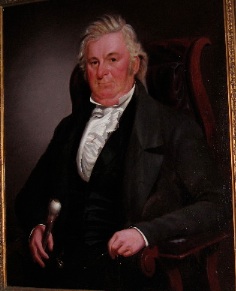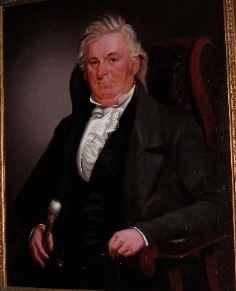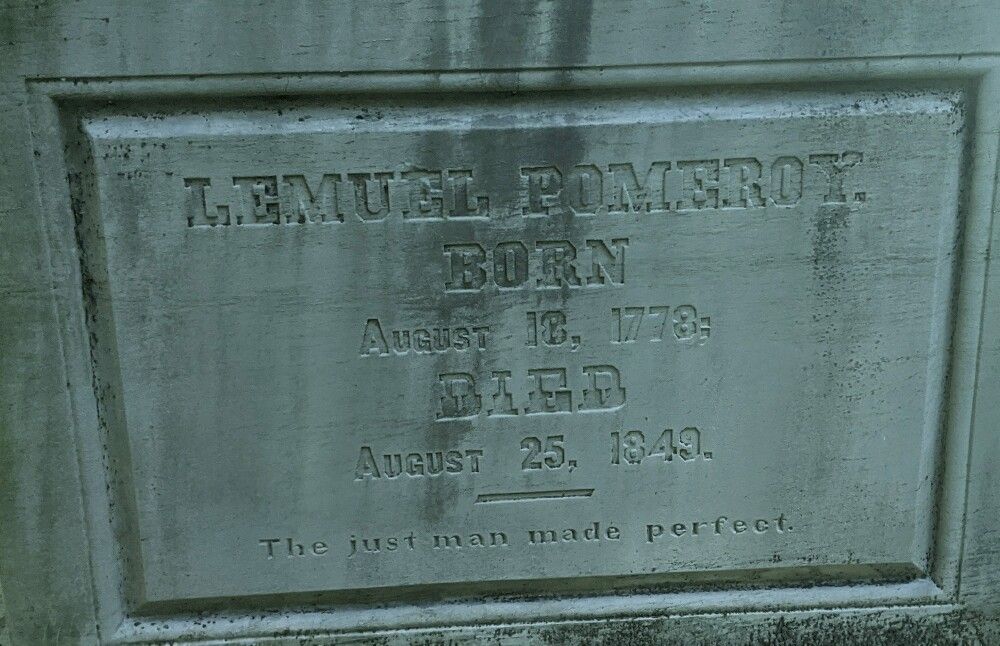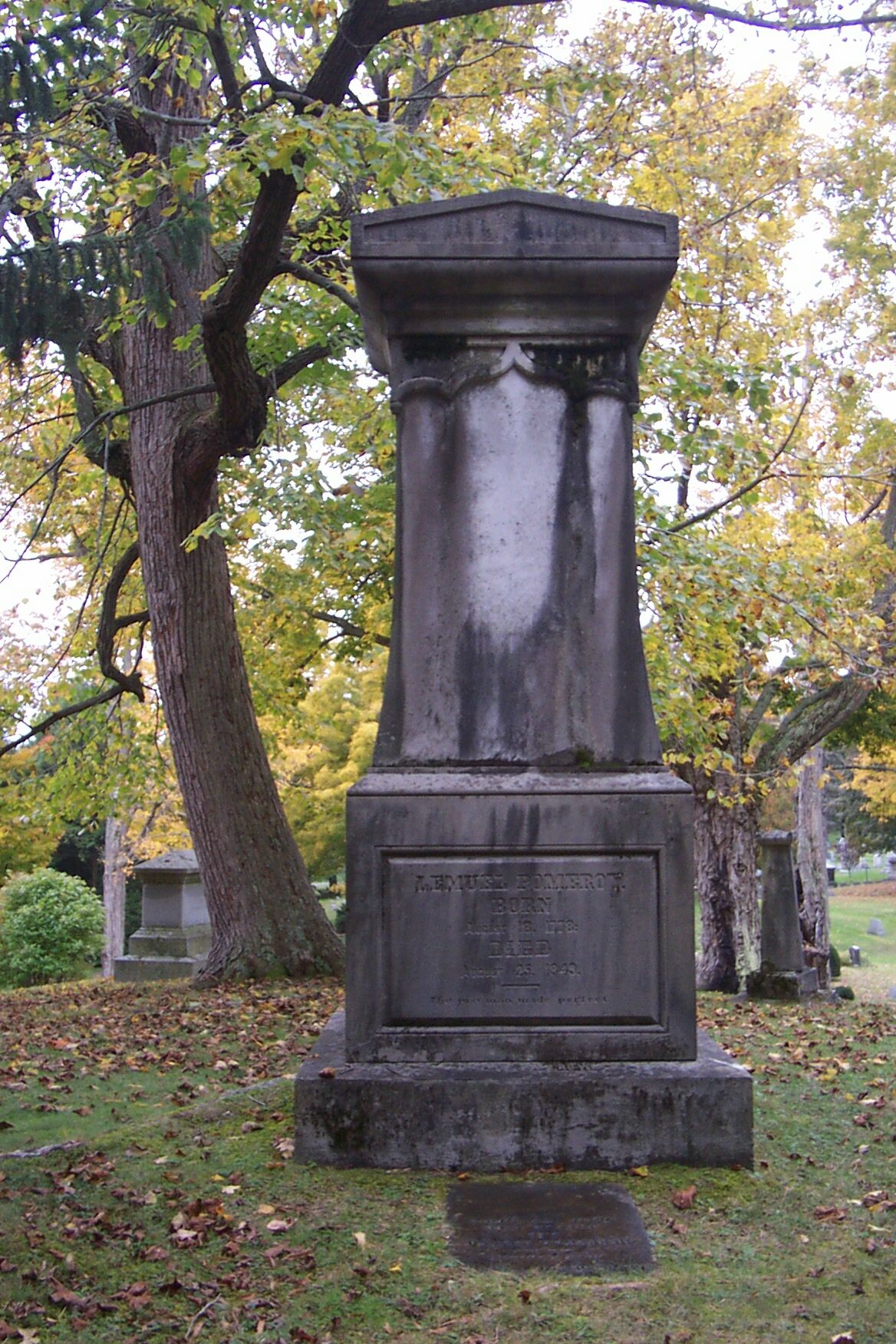Lemuel Pomeroy was a true Pittsfield "shooting star." He manufactured the "Pomeroy musket" at his shop on what is now the corner of East Street and Pomeroy Avenue, and in some ways was responsible for a gunpowder explosion that shook the town one sultry Pittsfield summer night.
If nothing else, Pomeroy was confident. He was born in Southampton on Aug. 18, 1778, and his descendants had served successfully as merchants and in business in the Connecticut Valley.
Pomeroy, however, chose to make a stake in Western Massachusetts, arriving in 1812 in Pittsfield with his wife Heart (Lester) Pomeroy. He also arrived with an anvil that his ancestors had carried from their home in Windsor, Conn., north along the Connecticut River to Southampton.
Generations of Pomeroys preserved that anvil, and it soon earned "family heirloom" status.
During his first year in Pittsfield, Pomeroy purchased what would later be known as the Pomeroy homestead on South Street, and in short order he became one of Pittsfield's most public-spirited, wealthy and influential citizens. An accomplished blacksmith, he spent his non-working hours involved with local politics.
His blacksmith skills were such that his shop was one of just six in the state to be commissioned to make small arms for law enforcement and the military. Pomeroy turned out 2,000 guns and made good money in the process.
But even the great ones endure speed bumps, and Pomeroy was no exception. With a rare lack of foresight, Pittsfield placed its gunpowder in a building in the center of town.
And in July 1838, the inevitable happened.
About 700 pounds of gunpowder was stored in the Pomeroy armory, some 400 pounds of that total belonging to Pomeroy for testing his muzzles. The rest belonged to the U.S. government and other merchants.
Pittsfield citizens were bothered greatly in the spring and summer of 1838 by random but frequent acts of vandalism from the town's restless youths. Nocturnal misdemeanors though they were, the unhinged signs, removed fences and other acts were annoying at best.
Not content with the "small stuff," the offenders upgraded their mischief and began rolling out state-owned artillery at night and fire cannons in the dead of night. The state Adjunct General finally recalled the artillery to Boston, and in defiance of that maneuver the local perpetrators unleashed one final act.
With the striking of just one match, they blew up the armory.
It also took down much of what surrounded it. Thankfully, no lives were lost. This was little solace to Nelson Strong, whose house on nearby Fenn Street was a "total wreck." Doors became unhinged and were thrown on the beds where the family was sleeping, and all crockery in the house lay shattered.
Some 20 buildings, including churches and the dwelling of North Street resident James Durham, suffered damage, mostly due to shattered glass. A committee was formed to bring to justice those who had executed the crime, but no one was ever held accountable.
Pomeroy, meanwhile, was embarrassed but remained solvent. Boasting an easy demeanor, he often stayed silent at town meetings and let the rest have their way. He then spoke his mind, and that often was the tact the town took.
Pomeroy, who is in the National Firearms Hall of Fame Museum in Fairfax, Va., died in Pittsfield in 1858 at the age of 80.
Courtesy of the Berkshire Eagle
Lemuel Pomeroy was a true Pittsfield "shooting star." He manufactured the "Pomeroy musket" at his shop on what is now the corner of East Street and Pomeroy Avenue, and in some ways was responsible for a gunpowder explosion that shook the town one sultry Pittsfield summer night.
If nothing else, Pomeroy was confident. He was born in Southampton on Aug. 18, 1778, and his descendants had served successfully as merchants and in business in the Connecticut Valley.
Pomeroy, however, chose to make a stake in Western Massachusetts, arriving in 1812 in Pittsfield with his wife Heart (Lester) Pomeroy. He also arrived with an anvil that his ancestors had carried from their home in Windsor, Conn., north along the Connecticut River to Southampton.
Generations of Pomeroys preserved that anvil, and it soon earned "family heirloom" status.
During his first year in Pittsfield, Pomeroy purchased what would later be known as the Pomeroy homestead on South Street, and in short order he became one of Pittsfield's most public-spirited, wealthy and influential citizens. An accomplished blacksmith, he spent his non-working hours involved with local politics.
His blacksmith skills were such that his shop was one of just six in the state to be commissioned to make small arms for law enforcement and the military. Pomeroy turned out 2,000 guns and made good money in the process.
But even the great ones endure speed bumps, and Pomeroy was no exception. With a rare lack of foresight, Pittsfield placed its gunpowder in a building in the center of town.
And in July 1838, the inevitable happened.
About 700 pounds of gunpowder was stored in the Pomeroy armory, some 400 pounds of that total belonging to Pomeroy for testing his muzzles. The rest belonged to the U.S. government and other merchants.
Pittsfield citizens were bothered greatly in the spring and summer of 1838 by random but frequent acts of vandalism from the town's restless youths. Nocturnal misdemeanors though they were, the unhinged signs, removed fences and other acts were annoying at best.
Not content with the "small stuff," the offenders upgraded their mischief and began rolling out state-owned artillery at night and fire cannons in the dead of night. The state Adjunct General finally recalled the artillery to Boston, and in defiance of that maneuver the local perpetrators unleashed one final act.
With the striking of just one match, they blew up the armory.
It also took down much of what surrounded it. Thankfully, no lives were lost. This was little solace to Nelson Strong, whose house on nearby Fenn Street was a "total wreck." Doors became unhinged and were thrown on the beds where the family was sleeping, and all crockery in the house lay shattered.
Some 20 buildings, including churches and the dwelling of North Street resident James Durham, suffered damage, mostly due to shattered glass. A committee was formed to bring to justice those who had executed the crime, but no one was ever held accountable.
Pomeroy, meanwhile, was embarrassed but remained solvent. Boasting an easy demeanor, he often stayed silent at town meetings and let the rest have their way. He then spoke his mind, and that often was the tact the town took.
Pomeroy, who is in the National Firearms Hall of Fame Museum in Fairfax, Va., died in Pittsfield in 1858 at the age of 80.
Courtesy of the Berkshire Eagle
Family Members
-
![]()
Olivia Hart Dewey
1801–1885
-
![]()
Lemuel Pomeroy
1803–1853
-
![]()
Elizabeth Pomeroy Jackson
1805–1882
-
![]()
Parthenia Little Pomeroy Brewster
1806–1876
-
![]()
Eunice Pomeroy Davis
1808–1885
-
Harriet Pomeroy Chesbrough
1809–1875
-
![]()
Emily Pomeroy Dodge
1811–1867
-
![]()
Theodore Pomeroy
1813–1881
-
![]()
Robert Pomeroy
1817–1889
-
![]()
Edward Pomeroy
1820–1889
Advertisement
Advertisement


























